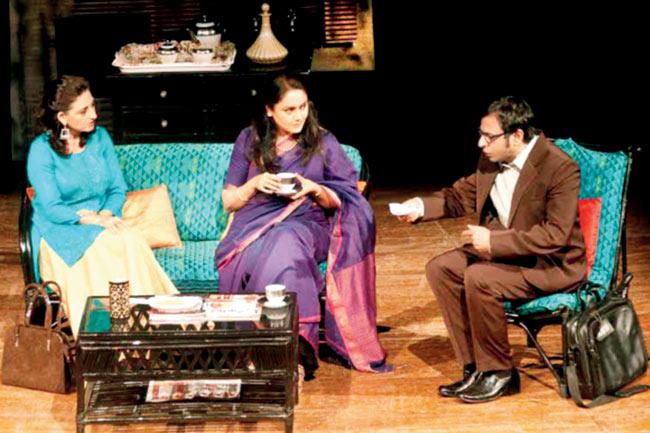Like people who live near airports cease to react to the noise of an airplane, it took a friend, who is not a habitual theatergoer to point this out: Why do audiences in Mumbai laugh at scenes that are meant to be sad or sensitive?


ADVERTISEMENT
Like people who live near airports cease to react to the noise of an airplane, it took a friend, who is not a habitual theatergoer to point this out: Why do audiences in Mumbai laugh at scenes that are meant to be sad or sensitive?
The play being watched for Lillete Dubey’s production of Girish Karnad’s Boiled Beans On Toast. A particular scene in question: A mother is telling her son that when she was younger, her husband’s neglect and the breaking up of a friendship with a cherished companion, led her to contemplate suicide. Before swallowing sleeping pills herself, she had mixed some in her child’s milk and fed it to him. Even though the scene was meant to revisit a tragedy, the audiences laughed.

Not just for laughs: Boiled Beans on Toast is a piquant play in which Karnad picks vignettes from the lives of people in Bangalore. Pic/Narendra Dangiya, NCPA
Recalling other such instances, there was a play called Between The Lines, about marital strife and the audience turned it into a comedy. Even worse, was a play called Mahua about poor tribals struggling for survival, in which come profanity was used, and audiences guffawed with amusement.
The easiest way to get a laugh is to utter a four letter word (or any swear word) on stage.
It looks like a large chunk of the audience goes to a play or movie to be entertained, and are determined to enjoy themselves even if the intention of the work is not just to entertain, but also to get audiences to reflect on the world around them.
To some extent, commercial cinema has to be blamed — the industry has got audiences addicted to well-packaged but simple-minded cinema, that does not encourage thought. In fact, audiences are encouraged to leave their brains at home. Sadly enough, they often do.
Fortunately, neither Girish Karnad nor Lillete Dubey produce mindless work.
Boiled Beans On Toast is a sharply observed and piquant play in which Karnad picks vignettes from the lives of people in Bangalore (the play could fit in just as well in Mumbai, as it did in Pune in Mohit Takalkar’s excellent Marathi version, Uney Purey Shahar Ek), a city in a state of flux, rapid urbanisation and arrival of immigrants with their dreams of success.
Karnad’s characters are unusual to say the least. There’s Prabhakar, an ambitious young man (Joy Sengupta), who has arrived from a verdant village, and actually enjoys the traffic, noise, crowds, pollution of a concrete jungle city.
There’s a socialite, Kitty (Avantika Akerkar), with the peculiar tendency to drop names and offer to change the lives of hopeful career seekers through her connections with important people.
It doesn’t matter to her that she ruins these lives with her pretence. Then, there’s the grandmother (Meenal Patel), who discovers the joys of gambling on races late in life. The lonely housewife (Deepika Deshpande Amin) finds meaning in life by working at a cancer hospice, and if she can no longer shed tears for herself, she weeps for a large rain tree outside her window, the loss of which unsettles her.
There are the domestic helpers whose ambitions are limited but just as fierce. Moving up from cleaner to cook is a dream for a poor working class woman, while another steadily climbs up a ladder of her own creation with the help of a succession of men she calls ‘first cousins’.
Karnad looks at these characters with a lot of sympathy tinged with some amusement and an absolute lack of judgment — like the young rock musician who sees himself as an incarnation of Sage Purandaradas (the great Carnatic music composer), and finds it in himself to care about all these characters surrounding him.
These people are tough and capable of landing on their feet after losing everything but his sanity, due to Kitty’s whimsicality, Prabhakar is still capable of dreaming of a future for himself and his family.
One very successful contemporary play that talks of urban loneliness and hope is White Lilly Ani Night Rider, which is still running successfully and has just come up with a hinglish version, so that it can reach a wider audience.
Originally created by Milind Phatak and Rasika Joshi, the play was revived last year by Phatak and Sonali Kulkarni and has turned out to be a huge hit again.
The play about two lonely hearts in their thirties, looking for love is funny enough to make audiences laugh, but with undertones of melancholy that needs the kind compassion today’s audiences seems to be losing in its quest for spoon-fed entertainment.
Bhakti and Keshav become Internet chat friends, and decide to meet, but online romance can crash against offline reality.
Without underlining it, the play lays bare the sombre reality of urban life that may have no space left for the misfits. At least theatre reaches out to them … the audience is another matter altogether.
Deepa Gahlot is an award-winning film and theatre critic and an arts administrator. You can follow her on twitter @deepagahlot
 Subscribe today by clicking the link and stay updated with the latest news!" Click here!
Subscribe today by clicking the link and stay updated with the latest news!" Click here!






